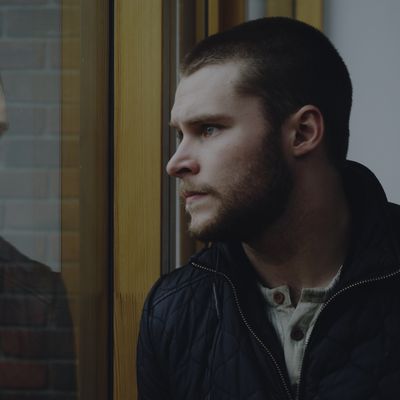
As Jean, an alcoholic single mother in Glassland, Toni Collette seethes and laughs and screams and flails, allowing herself to become animalistic, unbalanced, terrifying. She’s terrific, and terrifically committed … but believe it or not, it’s not her movie. The performance holding the film together belongs to Jack Reynor, as her son John, a young Dublin cabbie trying to keep her alive. Addiction dramas are a dime a dozen, and they usually traffic in the same kinds of clichés and broad, look-at-me-I’m-wild-and-fucked-up performances. Collette is better than most others at it, but Glassland smartly plays off Jean’s unhinged disintegration against John’s tense, subdued control. In that contrast lies the power of this film.
Glassland is really John’s story, and it’s steeped in his frustration. As John drives around in his cab, director Gerard Barrett places the camera in the backseat, looking out through the windshield, giving the sense of both movement and entrapment. (Is that the “glassland” in question here?) Unlike his friend Shane (Will Poulter), who’s planning to leave town despite a doting mother and a baby he barely sees, John dares not go anywhere. His family is too broken for him to do something so selfish as to give up and go away. His younger brother Kit (Harry Nagle) has Down syndrome and doesn’t live at home; Jean, who was never able to love Kit, doesn’t want the boy there. She can’t even bring herself to go to his birthday party.
So much of Glassland is about John quietly trying to keep things from falling apart, and it takes a special performer to make this kind of internalized torment compelling. Reynor is a young Irish actor who has already lined up some impressive credits: He had the riveting lead in Room, director Lenny Abrahamson’s 2012 feature What Richard Did, and he gives excellent supporting turns in A Royal Night Out and the Sundance sensation Sing Street. (Along the way, he also somehow managed a big role as the young hunk in the last Transformers movie, so, um, yeah, that.) So much of the film just requires him to stare and react, or not react, as it were. But we can feel that there is something going on in his head. We read his melancholy and his slow, simmering anger.
Glassland doesn’t fuss with the details of addiction and quitting. Rather, it focuses on their emotional and existential toll. Early on, John finds his mom unconscious and at the edge of death; at the hospital they tell him her liver is slowly failing. But for him, getting her to quit the sauce is less about making her healthy again and more about bringing the person she once was back to life, even if it’s for the last time. He shoots a video of her having a drunken meltdown, and later shows it to her, in a rare moment of defiance and anger. “This woman is not my mother,” he yells. “She’s an animal, and an impostor. I want my mother back!”
But John is also dying, in a sense. He keeps himself largely closed off, and it’s almost as if he’s slowly disappearing as a person — especially later in the film, when he finds himself taking on some unsavory jobs (kept suggestively vague) in an effort to get the money to put mom in a better place. It’s an act of doomed mutual sacrifice. Both mom and son are headed towards oblivion, but he wants to find a way, even if it’s ever so briefly, of making his family whole again. At least they’ll all go down together.


